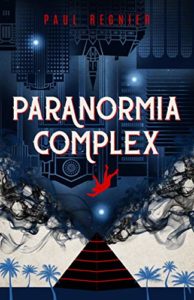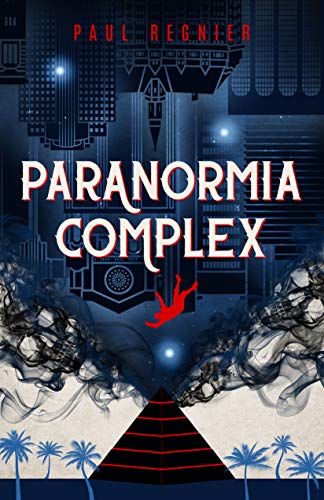Stories That Twist A Genre: Paranormia Complex
One thing self-publishing has accomplished, I think, is giving an opportunity for stories that twist a genre to find the readers who might love it. Back in the day when traditional publishing was the sole means for a book to see the light of day, agents and editors would often ask a writer, “Where do you see this book being shelved in a bookstore?” And bookstores, of course, had sections labeled Sci Fi/Fantasy, sometimes Horror, Romance, Historical, Adventure, and even Christian fiction (where books published by an Evangelical Christian Publishing Association member were shelved, regardless of the specific genre within the umbrella of Christian publishing).
Of course, books that are self-published still encounter the need to categorize their books, if they want to sell them on a site like Amazon. But when a book twists a genre, the author is the decision maker when it comes to labeling a book.
Take Paul Regnier’s latest book, Paranormia Complex, for instance. This recent release is the second in a two-book series that I would label, inadequately, supernatural suspense, with a twist of humor.
Regnier, however, chose to put the book in these categories on Amazon:
Christian Fantasy (Books)
Christian Fantasy (Kindle Store)
Religious Science Fiction & Fantasy (Kindle Store)
I’m guessing those particular categories give the book the best exposure. Then, as potential readers click over to the book description, they discover what kind of fantasy we’re talking about. Not epic fantasy or sword & sorcerer. Definitely Christian, but not in the usual sense (in which someone who isn’t a Christian comes to faith in Jesus). Here’s the back cover copy:
When demonic forces attack his city, can a lone comic bookstore employee stand against them?
Graphic novelist Chris Loury uncovers a supernatural threat to his community. As a result, he and his girlfriend Amber end up in the crosshairs of spiritual warfare. Finchelus, his quirky angelic guardian, promises aid, but his sporadic appearances offer little assurance. After the last supernatural encounter nearly took his life, Chris is reluctant to dance with the devil a second time.
Things escalate quickly when a hooded figure with red eyes and superhuman strength stalks Chris. As he survives one attack after another, the dark spirits grow stronger. When they launch deadly attacks on his friends and land Chris in the hospital, he fears this supernatural battle is beyond him.
Can Chris save his girlfriend, his city, and his own life from the gathering demonic storm?
 Only the allusion of a “quirky” angelic guardian gives a suggestion of the humor contained in the book, but by looking at the reviews, a potential buyer can quickly see that humor is a significant part of the booK:
Only the allusion of a “quirky” angelic guardian gives a suggestion of the humor contained in the book, but by looking at the reviews, a potential buyer can quickly see that humor is a significant part of the booK:
“. . . humor that paired nicely with the darker over tones and gravity of the spiritual side to the novel . . .”
“. . . it does carry on the same themes, character dynamics, and humor which made the original Paranormia so enjoyable and refreshing in the genre of supernatural Christian fiction. ..”
“. . . a supernatural tail [tale] of angels and demons with a sense of humor. . .” [I think the reviewer is saying the book has a sense of humor, not the demons.]
“Great humor. Good characters. The author is not afraid to address the supernatural world, from a Christian perspective. . .”
This last reviewer titled his comments, “Funny but serious” and that pretty much sums it up.
The point is, The Paranormia books, including this latest, Paranormia Complex, are unique. Would they have found a home with a traditional publisher? I suppose that’s always a possibility. I mean “mash ups” went through a period of popularity, so perhaps this combining of genres would have managed to find some traditional publisher’s list.
But since self-publishing has come into its own, there’s no worry about finding some house that believes in the books enough to take a risk. Instead, the author simply needs to write a good book—the book of his own imagining—and then put it out there for readers to find.
Clearly a growing number of readers are finding Regnier’s work. Here’s some of what one reviewer wrote:
While I loved the first book, this one somehow just surpassed it in every way. The stakes seemed higher. The dangers were deadlier. There was a lot more action. And, I have to admit, I liked the fact that Chris wasn’t on this perilous adventure all by himself this time. With his relationship with Amber, he had a partner in the spiritual warfare taking place in Long Beach, California, and I think that relationship truly helped the story.
In the end, readers always get the last say, but now what the traditional publisher thinks readers will like can be superseded by what the author and what the actual readers think they will like.
This paradigm allows for genre twists and things like humor in a supernatural suspense. I’m pretty sure readers who love the Paranormia books are glad there was a sure-fire way for the book to find its way into print.




























Sounds interesting!
Sounds a little like what I’ve been working on.